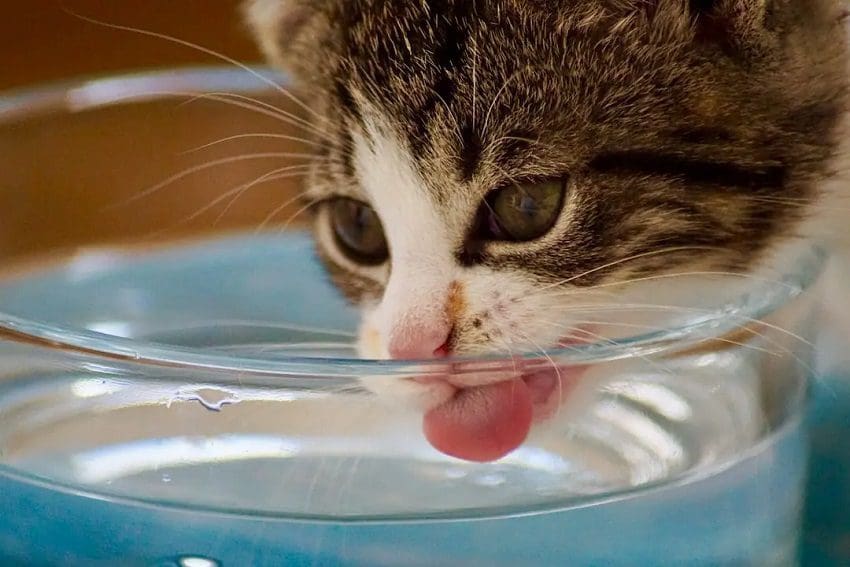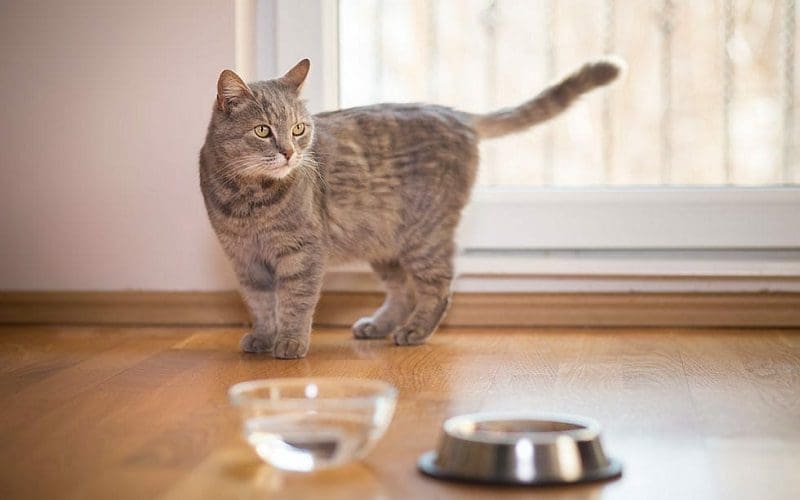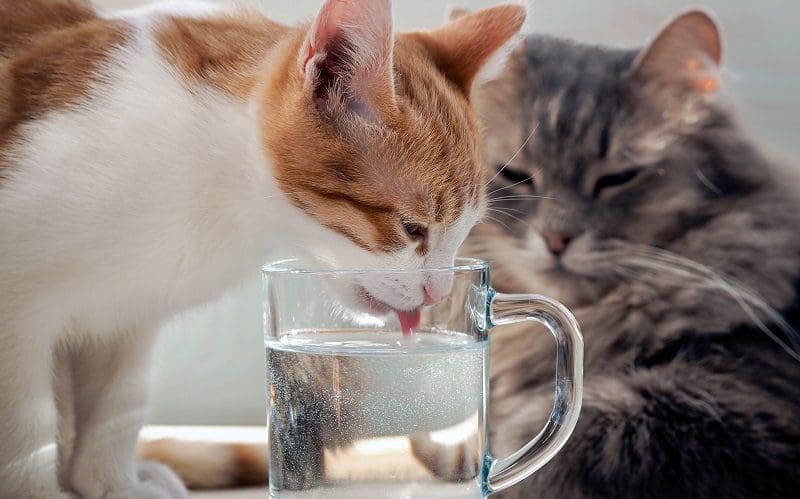Last Updated: 6 months ago
Cats are known for their independent nature, but one thing they can’t do on their own is stay hydrated.
It’s important to know how much water should cats drink in order to keep them healthy and happy.
Dehydration can be a serious issue for cats, so it’s important to understand the signs of dehydration and what causes it.
Let’s take a look at how to help your cat stay hydrated.
How Much Water Should A Cat Drink?

As a cat owner, it’s important to make sure your furry friend is getting enough water every day. Water helps keep cats hydrated and healthy. But how much water should cats drink?
The amount of water that a cat needs varies depending on their size, age, activity level and health condition.
A domestic cat drinks ideally between 3.5 and 4.5 ounces of water per day for every 5 pounds of body weight. This means that a 10-pound cat needs to consume approximately 7 to 9 ounces of water daily.
It is important for house cats to stay hydrated in order to maintain their overall health and wellbeing, so it is recommended that they have access to fresh, clean drinking water at all times.
Additionally, wet food can also help provide moisture since it contains up to 80% water content.
If your cat does not seem interested in drinking from water bowls or fountains, try adding some tuna juice or chicken broth as an incentive.
Kittens may require more than this as they are growing rapidly.
Here are some tips to make sure your cat gets their water needs:
- Make sure they always have access to clean fresh water.
- Add ice cubes to their bowl on hot days.
- Take them outside more often for exercise during cooler months.
- Give them wet food instead of dry kibble.
- Monitor their intake if they are sick or taking medication.
- Consider investing in a pet fountain which will encourage a cat drinking more frequently throughout the day.
By following these simple steps you can help ensure that your beloved feline companion stays happy and healthy all year round!
Signs That Your Cat May Be Dehydrated

Dehydration in cats can often go unnoticed because they are so good at hiding illness.
However, there are some telltale signs that you should look out for which could indicate dehydration in your cat.
The first sign is lethargy and lack of energy. If your normally active and playful kitty seems unusually sluggish or tired, this could be an indication of dehydration.
Other physical symptoms include dry mouth and gums, sunken eyes, loss of appetite and decreased skin elasticity (when you gently pinch their skin it will take longer than usual to return back to its normal shape).
Check your kitty litter too. Pee in the litter is a good sign that your cat is getting their water needs addressed.
If you notice any of these symptoms in your cat then it’s important to seek veterinary advice immediately as dehydration can lead to more serious health issues if left untreated.
Your vet will likely recommend increasing the amount of water available for your pet throughout the day as well as providing them with wet food rather than dry food which contains more moisture content.
It’s also important not to overfeed treats or snacks between meals as this can cause digestive problems leading to excessive thirstiness in cats – another common cause of dehydration!
By being aware of the signs that your cat may be dehydrated, you can help ensure they stay healthy and happy.
If you have any concerns about your pet’s health then don’t hesitate to contact your vet for advice.
How to Prevent Cat Dehydration

Cats have evolved to obtain most of their hydration from the food they eat, rather than drinking water. This is because cats are descended from desert hunters that had to conserve every drop of moisture in order to survive.
As a result, cats’ bodies have low thirst drives. They are very efficient at extracting moisture from their food and conserving it for later use.
Cats have an instinctive aversion to large amounts of water due to their association with predators like crocodiles and alligators which can lurk beneath the surface.
For this reason, cats tend to have less water intake unless absolutely necessary or if it’s been heavily flavored with something like tuna juice or broth.
While some cats may enjoy sipping on fresh water throughout the day, most felines will only consume enough liquid through their diet alone and won’t need more than a few tablespoons per day in total.
Dehydration can lead to serious health problems, so prevention is key. Here are some steps you can take to help prevent your cat from becoming dehydrated:
#1 Provide Fresh Water at All Times
Make sure that your cat always has access to clean drinking water.
Place multiple water bowls around the house so they don’t have to search for them when they get thirsty.
You may also want to consider adding a little bit of flavor (such as tuna juice) or even ice cubes if your cat isn’t drinking enough water on their own.
#2 Feed Them Wet Food
Wet food contains more moisture than dry food, which helps keep cats hydrated and healthy overall.
Try switching out one meal per day with wet food instead of dry kibble if possible!
#3 Take Them for Regular Checkups
Taking your cat for regular vet visits will ensure that its hydration levels are being monitored properly by a professional veterinarian.
A vet can advise you on any changes needed in order to maintain optimal health for your pet.
A checkup can also uncover illnesses that may require increasing water intake, such as urinary tract disease.
#4 Monitor Their Behavior
Pay attention to how much time your cat spends on drinking and urinating each day, as this could indicate whether or not they’re getting enough water consumption.
If you notice any sudden changes in these behaviors then make sure you contact your vet right away just in case there’s an underlying issue causing the change.
Changes that point to chronic kidney disease or diabetes mellitus may require medical attention immediately.
Following these simple steps will help ensure that your feline friend stays happy and healthy while avoiding dehydration-related issues down the line.
Conclusion
It is important to understand how much water should cats drink in order to ensure your cat’s health and well-being.
Cats need access to fresh, clean water at all times and should be monitored for signs of dehydration, such as lethargy or loss of appetite.
If you suspect that your cat may be dehydrated, contact your veterinarian immediately.
With the right care and attention, you can help keep your feline friend healthy and hydrated!
